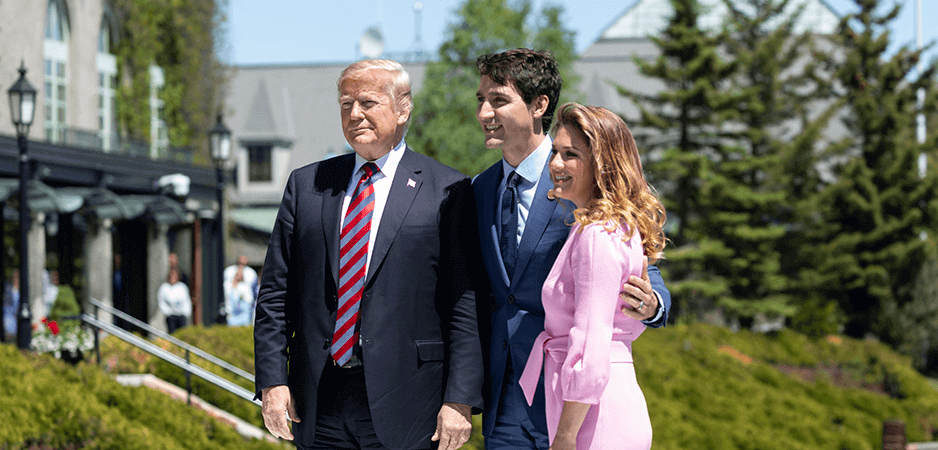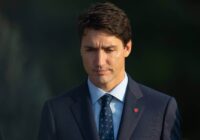Trump is on a war of words with Trudeau and other G7 members, and they have turned it into a public spat.
The usual way of describing disagreements between nations involves a choice between incident, crisis, conflict, confrontation and a few other words. Reporting on the G7 summit in Canada, Reuters offers the surprisingly accurate term spat to describe the state of play between Donald Trump and the other six members.
“The spat drew in Germany and France, which sharply criticized Trump’s decision to abruptly withdraw his support for a Group of Seven communique hammered out at a Canadian summit on Saturday, accusing him of destroying trust and acting inconsistently.”
Here is today’s 3D definition:
Spat:
A verbal fight between two or more people considered to be intimate, usually initiated by an immature personality prone to exhibit petulant behavior
Contextual note
The linguistic outcome of the G7 summit turned out to be far more impressive than the vague and toothless communiqué that was intended to present a consensus, but which Trump refused to acknowledge.
Attempting to be witty (and failing) Trump tweeted, “Fair Trade is now to be called Fool Trade if it is not Reciprocal.” It sounds as if Trump thinks this might be a pun, but puns, to be successful, require a higher degree of homonymy. Capitalizing the first letter of “reciprocal” presumably serves as a cue or prompt to shout the word.
Trump continues with, “Then Justin acts hurt when called out!” referring to Canadian Prime Minister Justin Trudeau. This is the language of an authentic school playground spat. Sissies act hurt when called out. True men (i.e. bullies) do the calling out.
The US president then complains about “protecting many of these same countries that rip us off.” Accusing allies with whom one is working collaboratively of a rip-off, even when engaged in negotiation with them, is closer to barroom ranting than diplomatic positioning.
Trump’s advisers quickly followed suit. Larry Kudlow offered this: “[Trudeau] really kind of stabbed us in the back.” Perhaps he was thinking of Julius Caesar and Marc Antony’s evoking “the most unkindest cut of all,” the wound inflicted by Brutus. More likely he was just uttering a banal cliché to indicate betrayal, as if Trudeau were Trump’s vassal.
Trade adviser Peter Navarro waxed theological when he pronounced that “there is a special place in hell for any leader that engages in bad faith diplomacy.” Navarro elevates Trump from Roman emperor (or would-be emperor) to the lord of the last judgment. But again, this is less of a creative metaphor than a banal hyperbolic cliché, the same Madeleine Albright used to insult women who didn’t support Hillary Clinton in 2016.
Historical note
Erik Nielsen, chief economist at Unicredit Bank, summed up the historical importance of this “spat.” “The world as we know it, namely the U.S.-led rules-based multilateralism, is now in serious danger of unraveling.” Describing the current system as both “rules-based” and “US-led” reminds us that the geopolitical world we live in was created in the aftermath of World War II, that it prospered during the Cold War and took on a new dimension after the fall of the Soviet Union. This is when thinkers such as Francis Fukuyama believed that an apparently benevolent capitalist system was capable of homogenizing the entire world.
Fair Trade is now to be called Fool Trade if it is not Reciprocal. According to a Canada release, they make almost 100 Billion Dollars in Trade with U.S. (guess they were bragging and got caught!). Minimum is 17B. Tax Dairy from us at 270%. Then Justin acts hurt when called out!
— Donald J. Trump (@realDonaldTrump) June 11, 2018
We’re now discovering that the idea that a system could, like a game or sporting event, be “rules-based” was a factor of civilization and growth. But at the same time, and long before Trump, we’ve had the opportunity to discover that if the rules are defined and enforced by a single culture, they will undermine the very balance they were intended to create.
A level playing-field is the first rule of a “rules-based” system. During the Cold War, an artificial balance between capitalism — both a commanding economic force and an ideology — and communism maintained the illusion of a level playing field, if only because there were two teams on the ground. After the dismantling of the Soviet Union and the conversion of China to state capitalism, a financial, industrial and military culture defined in and enforced exclusively by the US changed the perception of the meaning of “rules-based.” The players of one team had assumed the authority of referees. When they created a crisis — whether it was in the Middle East (2003) or on Wall Street (2007-08) — the rest of the world (including America’s own citizens) had no choice but to play the role of helpless spectator, as well as accept to pay for all the damages.
Pundits analyze the economic, political and military aspects of these events, but they rarely acknowledge or assess the cultural dimension. The made-in-USA financial and military culture that had initially defined the rules weakened under the strain of crises it could no longer manage or solve. The superficially seductive culture of personal success, glamor, celebrity and conspicuous consumption that the US had relied on to maintain the aspirational adhesion of the rest of the world progressively lost its power of persuasion.
Donald Trump embodies that glitzy and largely irresponsible, unaccountable culture, to the point of caricature. He didn’t invent it, but he is a master of displaying it. Today’s spat is both a symptom of a longer evolution and an indicator of the urgent global need both to revise the rules and radically rethink their cultural basis.
*[In the age of Oscar Wilde and Mark Twain, another American wit, the journalist Ambrose Bierce, produced a series of satirical definitions of commonly used terms, throwing light on their hidden meanings in real discourse. Bierce eventually collected and published them as a book, The Devil’s Dictionary, in 1911. We have shamelessly appropriated his title in the interest of continuing his wholesome pedagogical effort to enlighten generations of readers of the news. Updated: June 13, 2018, at 12:51.]
The views expressed in this article are the author’s own and do not necessarily reflect Fair Observer’s editorial policy.
Photo Credit: The White House
Support Fair Observer
We rely on your support for our independence, diversity and quality.
For more than 10 years, Fair Observer has been free, fair and independent. No billionaire owns us, no advertisers control us. We are a reader-supported nonprofit. Unlike many other publications, we keep our content free for readers regardless of where they live or whether they can afford to pay. We have no paywalls and no ads.
In the post-truth era of fake news, echo chambers and filter bubbles, we publish a plurality of perspectives from around the world. Anyone can publish with us, but everyone goes through a rigorous editorial process. So, you get fact-checked, well-reasoned content instead of noise.
We publish 2,500+ voices from 90+ countries. We also conduct education and training programs
on subjects ranging from digital media and journalism to writing and critical thinking. This
doesn’t come cheap. Servers, editors, trainers and web developers cost
money.
Please consider supporting us on a regular basis as a recurring donor or a
sustaining member.
Will you support FO’s journalism?
We rely on your support for our independence, diversity and quality.






